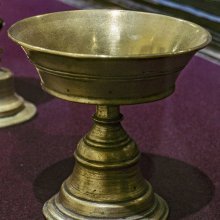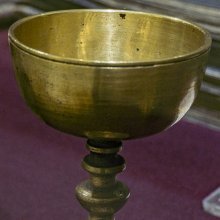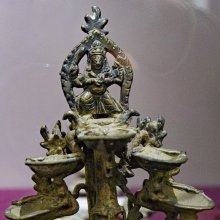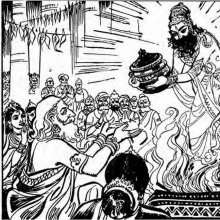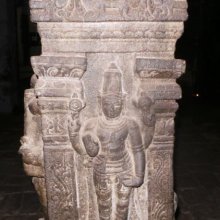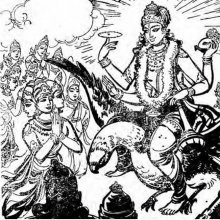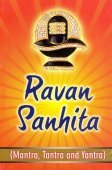Deva, Devā: 52 definitions
Introduction:
Deva means something in Buddhism, Pali, Hinduism, Sanskrit, Jainism, Prakrit, the history of ancient India, Marathi, Hindi, biology. If you want to know the exact meaning, history, etymology or English translation of this term then check out the descriptions on this page. Add your comment or reference to a book if you want to contribute to this summary article.
Deva has 52 English definitions available.
Images (photo gallery)
(+55 more images available)
Languages of India and abroad
Sanskrit dictionary
[Deutsch Wörterbuch]
Source: Cologne Digital Sanskrit Dictionaries: Böhtlingk and Roth Grosses Petersburger WörterbuchDeva (देव):—
--- OR ---
Deva (देव):—2. m. = devar, devara [COLEBR.] und [Loiseleur Deslongchamps] zu [Amarakoṣa 2, 6, 1, 32.]
--- OR ---
Deva (देव):—
Source: Cologne Digital Sanskrit Dictionaries: Sanskrit-Wörterbuch in kürzerer FassungDeva (देव):—1. —
1) Adj. (f. ī) himmlisch , göttlich ; auch als Ausdruck besonderer Vortrefflichkeit. Superl. devatama und devitamā. —
2) m. — a) ein Himmlischer , ein Gott ; auch von missgünstigen Wesen. Am Ende eines Comp. im [Bhāgavatapurāṇa] ein Gott unter — , so v.a. unter — am Höchsten angesehen. Am Ende eines adj. Comp. Jmd zum Gott habend auch so v.a. wie einen Gott verehrend. — b) viśve devāḥu sämmtliche Götter und eine best. Klasse von Göttern. Vgl. viśvedeva. — c) Bez. der Zahl 33 [Gaṇita 33.MADHYAM.22.] — d) schlechtweg Gott heisst Indra als Regenspender. Daher bei den Lexicographen die Bed. Wolke. — e) Götterbild , Idol [Viṣṇusūtra 9,33.14,2.11.60.] — f) der Gott auf Erden oder unter den Menschen ist — α) ein Priester , ein brahman. — β) ein Fürst , König , Prinz. — g) *Kind , Dummkopf , Tölpel [Indische studien von Weber 13,338.] — h) *ein Mann , der einem besondern Geschäft nachgeht. — i) *Lanzenträger. — k) *Schwert [Galano's Wörterbuch] — l) *Wetteifer. — m) *Spiel. — n) Nomen proprium verschiedener Männer [VP.².] — o) Hypokoristikon von devadatta. —
3) m. (*n.) ein Sinnesorgan. —
4) *f. devā — a) Hibiscus mutabilis. — b) Marsilea quadrifolia. —
5) f. devī — a) Göttin. — b) schlechtweg Göttin heisst — α) Sāvitrī , die Gattin Brahman's. — β) Durgā , die Gattin Śiva’s [290,12.] — γ) *die Geliebte des Sonnengottes. — c) die Gemahlin eines Fürsten ; auch eine Königstochter , Prinzessin. — d) *ein best. Vogel , = śyamā. — e) *Bez. verschiedener Pflanzen: Medicago esculenta , Sanseviera Roxburghiana , Linum usitatissimum , einer Cyperus-Art , Clypea hernandifolia , Koloquinthengurke , Glycine debilis , Terminalia chebula , = liṅginī und vandhyākarkoṭakī. — f) eine best. übernatürliche Kraft. — g) Nomen proprium — α) einer Apsaras. — β) *der Mutter des 18ten Arhant’s der gegenwärtigen Arasarpiṇī.
--- OR ---
Deva (देव):—2. m. = devar , devara.
Sanskrit, also spelled संस्कृतम् (saṃskṛtam), is an ancient language of India commonly seen as the grandmother of the Indo-European language family (even English!). Closely allied with Prakrit and Pali, Sanskrit is more exhaustive in both grammar and terms and has the most extensive collection of literature in the world, greatly surpassing its sister-languages Greek and Latin.
See also (Relevant definitions)
Starts with (+1393): Deva kaanchana, Deva kanagilu, Deva kanchanamu, Deva kanigalu, Deva Sutta, Deva Vihara, Deva-Brahmana-bhukti-varja, Deva-cchanda, Deva-deya, Deva-ganneru, Deva-kanagile, Deva-kanchan, Deva-karana, Deva-kasla, Deva-kriya, Deva-tumbe, Deva-varika, Deva-vibhavana, Deva-vritti, Devaba.
Ends with (+669): Abhassara-deva, Abhayadeva, Abhinandadeva, Abhishtadeva, Abhyuccadeva, Abhyuchchadeva, Acaladeva, Acaryadeva, Accutadeva, Achaladeva, Acharyadeva, Acittadeva, Adeva, Adhideva, Adhinathadeva, Adhyatmavasudeva, Adideva, Adityadeva, Aggideva, Aghadeva.
Full-text (+5242): Devayatana, Devaraja, Devadeva, Agnideva, Diptaroman, Devakula, Devaratha, Devamaya, Devabhuya, Devadroni, Mahadeva, Devamgama, Taratha, Devanama, Camuhara, Tushita, Devasva, Devavi, Dhiroshnin, Devavasa.
Relevant text
Search found 356 books and stories containing Deva, Devā, Dēva, Ḍeva, Ḍēva; (plurals include: Devas, Devās, Dēvas, Ḍevas, Ḍēvas). You can also click to the full overview containing English textual excerpts. Below are direct links for the most relevant articles:
Rig Veda (translation and commentary) (by H. H. Wilson)
Chandogya Upanishad (Madhva commentary) (by Srisa Chandra Vasu)
First Adhyaya, Fourth Khanda (5 mantras)
First Adhyaya, Second Khanda (14 mantras)
Puranic encyclopaedia (by Vettam Mani)
Garga Samhita (English) (by Danavir Goswami)
Verse 5.24.98 < [Chapter 24 - The Killing of the Kola Demon]
Verse 3.4.7 < [Chapter 4 - The Coronation-Bathing of Śrī Kṛṣṇa]
Verse 1.11.64 < [Chapter 11 - Description of Śrī Kṛṣṇacandra’s Birth]
The Linga Purana (by J. L. Shastri)
Chapter 17 - The greatness of Śiva < [Section 2 - Pūrvabhāga]
Chapter 101 - Destruction of Kāma (madanadāha) < [Section 1 - Uttarabhāga]
Chapter 99 - Destruction of Dakṣa’s sacrifice < [Section 1 - Uttarabhāga]
Related products
(+5 more products available)
